- Home
- Patricia Wynn
Sophie's Halloo Page 2
Sophie's Halloo Read online
Page 2
It was getting late, and he wanted to be off early in the morning. He looked at his guests expectantly, but each seemed lost in private thoughts. Sir John was still regretting the rest of the season he would be missing; Lady Corby just looked tired. And Sophie, who had been gazing absently at some remote object, came to when she sensed his eyes upon her. She smiled again, not quite so boldly this time, but questioningly.
Tony took her hand and bowed over it. “I would be honoured if you would allow me to call on you in London, Miss Corby,” he said.
Sophie opened her mouth to respond, but her father, suddenly alert, broke her off. “Of course, of course, naturally,” he said unconvincingly. “We’ll be happy to see you. We must be off to bed now, though, so we can get into Town early tomorrow. I’d better have a word with that innkeeper.”
“As to that, Sir John,” offered Tony, “it has occurred to me that I have a means of making other arrangements for the night, and I would be happy to give you my room. No need to wake poor Jem or Dick, as it is certain to be, and you will have a much better bed. I shall ask the man to remove my things.”
Sir John appeared uncertain, but grudgingly accepted. He had lost much of his enthusiasm for his host since Tony’s admission that he did not hunt, a fact that did not escape Tony. “If it will not discomfit you too much,” Sir John said with gruff courtesy.
“Not at all,” replied Tony. He went in search of the landlord and gave him his instructions. Then he returned and bade the Corby family good-night. As they ascended the stairs, Tony was encouraged by the fact that Sophie looked back at him shyly over her shoulder. Something prompted him to wink at her wickedly and he was rewarded by seeing her lips form a silent “o,” and then a quick dimple before she turned and hastened up the stairs.
He looked after her for a moment, grinning speculatively, before returning to the parlour and polishing off his pint of ale. Then, thrusting his hands once again deeply into his pockets, he kicked his same oak chair neatly over to the fire and lowered himself into it. As he sank lower and lower against the hard back, he lifted his booted legs, crossed them at the ankle and plunked them down once again on the footstool.
A tempting thought struck him as he lay there again watching the crumbling coals. What a remarkably fine reward it would be for some lucky fellow to waken such a lovely sleeping beauty as Sophia Corby. He wondered what it would take to make her eyes widen with delight when a man entered the room, and how he could entice those charming dimples more often from their creamy hiding place.
Sophia, he mused sleepily, the wise one. He would find out just how aptly named she had been. Surely there was something out of the ordinary behind that air of vague detachment. Her direct, unschooled manner was intriguing.
Tony smiled as pleasant thoughts and the fire’s warmth conspired to make him sleepy, and soon, despite his posture, he dropped easily off to sleep.
CHAPTER TWO
Sophie woke the next morning feeling much happier than she had expected. She pondered and then remembered the strange gentleman from the night before. At first she had not really noticed him or had dismissed him as being like any other gentleman of her limited acquaintance. But then he had suddenly seemed quite otherwise.
He does not hunt, she thought. The novelty of it was still new and intriguing. She wondered what he could possibly do with his time, and this mystery alone was making her impending trip to London seem less of a misery already.
It was not that Sophie had a disinclination to visit the city of London or even that she was not curious to see it. It was simply that she did not relish the idea of going there to be married off, like a foxhound bitch being sent to be bred.
From the little that Sophie had seen of marriage, she had formed a poor impression of it, and she doubted it would please her. But suddenly, it seemed there was a new consideration. Sir Tony had assured her that she would meet many gentlemen who were not addicted to the chase, and curiosity about them put a new light on her adventure. Papa had ridiculed the idea, she remembered, but logic told her that if her father seldom went to Town, had even an aversion to it, then perhaps those gentlemen who spent most of their time there were quite different. Sophie sat up in bed alert.
Sir Tony had winked at her. The strange thing was that she had not disliked it. He was not handsome, at least not in the florid, masculine way that her father had been as a young man, or the Prince Regent. But she did like the way he smiled at one, so openly, without reserve, and she had noticed, rather vaguely at first and more consciously later, that she liked the way he moved. He was tall and slender—but not lanky; at ease—but perfectly alert; relaxed—yet efficient. He had rather ordinary light brown hair and blue eyes, but he was pleasant to look at. It must be his constant expression of goodwill, which she found so attractive. Surely no one with that smile could intend to do her ill with an improper wink.
Sophie went downstairs for breakfast hoping to see him again, but learned along with her parents that Sir Tony Farnham had left quite early that morning.
The rest of the day was busy enough to keep her keenly tuned to her surroundings, for the impact of London town upon the senses of one raised in the country was something she had not anticipated. Every turned corner offered glimpses of things of which she had never been aware, and even her father grew animated in pointing out objects of interest to her, from the Town mansions of the great aristocrats to the gallows at Tyburn. If it were not for an occasional recollection of their mission there, Sophie would have declared herself well pleased with the city.
They arrived in Berkeley Square and found themselves quite content with the house Sir John had taken for the season. The public rooms were spacious enough to permit small but adequate gatherings when they should be ready to entertain company. They spent the rest of the day unpacking, but during the afternoon, Lady Corby managed to dash off a note to Sir John’s widowed sister, Mrs. Sarah Brewster, to let her know that they had arrived and were settling in.
Mrs. Brewster had married a wealthy gentleman from Kent, who had left her a house in Town, his property in Kent and a small fortune to go with it. She, like her brother, was an avid enthusiast of the chase, but because of a severe fall incurred in her middle years, she had been forbidden to ride again. Since that time, she had seldom visited her brother in Leicestershire, preferring the amusements of London to sitting about the countryside watching others have all the fun.
But she was quite happy to receive her brother’s family in Town and had written enthusiastically when she had heard of their plans to come. Soon after noon on the day following their arrival, she appeared, bursting in upon them like a whipper-in going after some wayward hounds.
“Hallo, Clarissa!” she boomed, taking her sister-in-law in a crushing embrace. “You are looking much too pale, gel! Looks like you’re off your feed.” She subjected Lady Corby to a careful scrutiny. “Not breeding again, I hope? No? That’s good. Where’s that girl Sophie?” she asked, turning abruptly. “Let me see you! Just as I remembered you. You look fine, gel! In prime form! You will take well.” She bugged Sophie mercilessly and patted her briskly on the back, while giving her a final bit of heartfelt advice. “Just don’t rush your fences.”
Though the sentiments were not what Sophie could wish, she had to smile. It was impossible not to like this bold, unconventional woman, even if she did not share one’s tastes.
Lady Corby, however, was slightly overcome. Between visits she tended to forget the full effect of Mrs. Brewster’s personality, and she might be forgiven for imagining that the experience of Town life might have had some moderating influence. Still, she, too, had an affection for her sister-in-law, despite their differences.
“Sadie,” she said rather breathlessly, “you are looking well. I’m so glad you were at home to get our message.”
“I wasn’t,” stated Aunt Sadie matter-of-factly. “Just got word this morning. But I loaded up and drove to Town immediately. Made it in record time, too, in this weather. I sha
ll have it reported to the Four-in-Hand Club, even though they will not count it officially. It will give them something to aim at.” She spoke without rancour.
“Oh, dear,” said Lady Corby faintly. “I fear we have inconvenienced you dreadfully.”
Aunt Sadie was astonished. “Of course not, gel! Did I say so? I always welcome a challenge. You know that. But enough of this. Where is my bow-legged whelp of a brother?”
By this time the sound of her booming voice had brought Sir John downstairs, and as she spoke he had come up behind her. Taking his cue, he put a rough arm around her rather thick waist and gave her a suffocating hug.
“Who’s this calling me bow-legged? Sadie, you have not changed a whit. Still game enough for anything, I’ll warrant.”
A rosy hue spread over Sadie’s rather rugged countenance. She gave Sir John a hardy slap on the chest, which nearly knocked him into the passageway. “Of course, I am, you impudent dog! There is more to life than fox-hunting, you know, though I miss it, of course. And as long as that cur of a doctor don’t tell me otherwise, I aim to enjoy it.”
Lady Corby, fearful that an exchange of brotherly blows might lead to some breakage in the hired furniture, hastily suggested that they sit and chat. Surprisingly, they seemed to have no objection, so she breathed a sigh of relief. Then no more than a few moments passed before brother and sister were deep in discussion of the losses to Sir John’s stable that year.
Sophie listened with only half an ear, letting her mind roam as she usually did during such discussions. Her thoughts over the past day and a half had tended to dwell on their host at the Black Swan. Her curiosity about him had only increased, and she wondered if she should see him again. But her mental wanderings were interrupted suddenly by the sound of a knock at the door, and presently the butler entered to announce a visitor. It was Sir Tony.
He strolled into the sitting room with that attractive ease Sophie had noted in him, tipping his beaver off and into his hand with one swift, graceful movement of head and wrist. Then resting with one hand on an elegant cane, he paused and scanned the room briefly before giving them all an engaging smile. Sophie’s eyes widened, and she smiled shyly as Lady Corby rose to her feet to greet him.
“Sir Tony,” she said in her gentle, welcoming way. “How kind of you to call on us so soon. However did you find us?”
He answered her readily, “I took the liberty of making a few inquiries about the square, Lady Corby. It was not really difficult. I hope I do not come before you are ready for visitors.”
“No, no,” she said. “Please do come in.”
Sir John by now had risen to his feet with less than his wife’s enthusiasm. “Farnham,” he said, nodding briskly. “Let me make you known to my sister, Mrs. Brewster.”
He started to extend his hand to Aunt Sadie, but she spoke quickly, “There is no need, John. I already know Sir Tony, though I did not know that you had made his acquaintance. What brings you here, you sly rascal?”
Lady Corby was rather startled by this familiar form of address, but Tony just grinned. “Why, I had hoped to find you here, Miss Sadie. I was fortunate enough to meet your brother and his family on the road, and I fancied I detected a resemblance.”
Sadie scoffed, and Lady Corby could only be glad that her sister-in-law was not near enough to give Sir Tony one of her cuffs on the chest. “That is just like your impudence! More like you came hoping to see my niece. You may wipe that silly grin off your face. You are not a villain in the hen house, you know.”
But Tony only grinned wider and turned to speak to Sophie, who was beginning to feel rather left out of his greeting. “I will confess,” he said. “I am delighted to see Miss Corby in such fine health. Good day to you, Miss Corby.”
Sophie was not used to gallantry, but she managed to smile without lowering her eyes. A dimple appeared briefly on one cheek, and Tony was gratified to find that she was interested enough by his coming to appear more alert than at their first meeting. He noticed, too, that the brighter light of day did nothing to diminish the tempting lure of Sophie’s dimples.
Lady Corby invited Tony to sit down, and he placed himself diplomatically near the elder ladies. Before long, Sir John had resumed his lament over the losses to his stable.
“I lost Dolly this year, Sadie,” he said. “I had meant to write you, but couldn’t bring myself to put it to paper. Knew you would be upset.”
“What happened?” his sister asked with evident dismay.
Sir John shook his head sadly. “Lost her flat out beneath me. It was a long run, near on two and three-quarter hours. Just too much for her finally, and near the beginning of the season—before she was in top form. If I had known we would have such a fine run that day, I would have taken one of the younger nags, but there was no way of knowing, of course,” he said sadly.
“The scent stayed strong throughout, even though we crossed two fallow fields in the course of the run. I feared she was flagging near the end, but of course, I could not abandon the chase. She took her last ditch flying. A sad business. I changed quickly to another mount to finish the run, of course, and sent my man to fetch her as soon as I reached him. He tried everything he could to save her, but she never made it back to the stable.”
“Tragic business!” said Sadie, a hint of hoarseness in her voice. “I remember riding her myself, many times. When you first acquired her. Remember that great run I had on her in ‘06? The one where Percival Blakehollow broke his leg?”
Sir John perked up instantly. He smiled ruminatively. “Aye,” he said. “That would have been the fifteenth November. I remember because I had the lead the following day and had to recount the whole to Percy who was laid up in bed. Dolly was a game one, wasn’t she? Hated to lose her. Miracle she lasted that long, though, when you come to think of it. She had her share of great runs.”
Sophie’s mind had wandered off again. She was disappointed that Sir Tony had placed himself so far from her chair and now feared that the conversation would never venture from the chase. He might not choose to call again, if he found them incapable of general discussion. She yawned openly, forgetting to cover her mouth, and her mother glanced at her with gentle reproach. But Sophie came to attention when she heard Tony speak. His expression throughout Sir John’s tale had been once again polite and attentive.
“Did you hunt then, Miss Sadie?” he asked with true admiration.
“Of course, boy,” answered Sadie, but she sighed. “T’was a bad fall that finished me.”
Sir John spoke proudly, “Sadie was a game girl, let me tell you. There never was a fence to stop her. My father said she was the best of us all, and all the Corbys hunt.”
“Do you hunt, Lady Corby?” asked Tony, turning to face his hostess.
Lady Corby appeared rather ashamed and said weakly, “No, Sir Tony. I am afraid not. But with all the children to look after...”
“Of course,” he hastened to reassure her. “I had not realized there were so many.”
“Eight,” said Sir John proudly, “and all the boys fine riders. Emma, too. All of them good Corbys, except Sophie here, who prefers to waste her time writing nonsense when she could be outdoors with the best of them.” He looked at his daughter reproachfully.
“Enough of that, Sir John!” exclaimed Sadie. “As I remember, Sophie is a fine rider, and if she does not choose to break her neck with the rest of you, well—” and here, though she obviously could not comprehend it, she spoke justly “—then that is her affair. What is this about writing?” she asked Sophie.
Her niece squirmed uncomfortably under their stares. “It is nothing,” she said dismissively. “I have just been attempting a bit of poetry.”
“Poetry!” scoffed Sir John. But Tony came to her rescue quickly.
“That is admirable. Miss Corby,” he said. “I am known to dabble in it myself, though my friends speak rather harshly of the result. They are so critical, in fact, that I may soon find myself reduced to the level of poet abste
ntious. I have decided to confine myself to birthday odes from now on.”
“And dashed impudent ones, I’ll warrant,” said Sadie with a laugh. “Hardly fit for royalty! I would be surprised to see a serious sonnet come out of that head of yours.”
Sir John did not appear to like the turn of the conversation. “Well, you fellows in Town get up to a deal of foolish nonsense, I know. But it beats me how Sophie can waste her time on poetry. It ought not to be in her blood. Clarissa comes from a long line of good hunting stock, and the children have all bred true but Sophie here.” He sighed.
Sounds like a litter of puppies, thought Sophie. She had hoped that Sir Tony’s comment would stop her father from expressing himself on her shortcomings in front of their guest, but, at least, now he seemed recalled to his manners enough to let the subject drop.
While he reminisced further about his own father’s prowess in the field, her mind wandered again, and she gazed out the window. The city outside was alive with activity, and she chafed against the social restraints, which kept a maiden lady indoors. In the country, at least, she would have been free to go on a solitary walk, as was her habit. But here, despite the lure of strange delights in all she spied, she had to wait for a parent’s escort. Sophie had to envy her Aunt Sadie her widow’s freedom to drive herself about Town at will.
“I should like to learn to drive a phaeton about London,” she said aloud suddenly to no one in particular. The others suspended their conversation, and her mother released a gentle, “Oh, dear.”
“I’ll teach you!” volunteered Aunt Sadie, in tones of hearty approval. “Be delighted to! I knew you had pluck, gel. Don’t worry, Clarissa,” she said as Lady Corby started to protest. “I’ll not let any harm come to the gel. You know that.”
“Speaking of driving out,” said Tony, taking advantage of the opportunity. “I had rather hoped that Miss Corby would take a turn in the park with me today.” Her sudden interjection had delighted him, coming as it did out of the blue, and he wondered what train of thought had brought her to that curious pronouncement. “That is, of course, if you have no objection,” he added, speaking to Lady Corby.

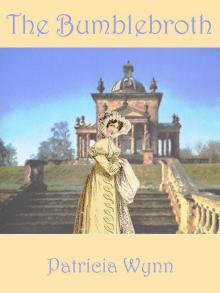 The Bumblebroth
The Bumblebroth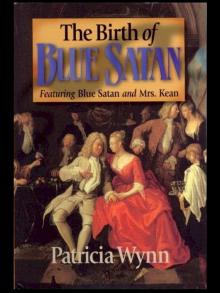 The Birth of Blue Satan
The Birth of Blue Satan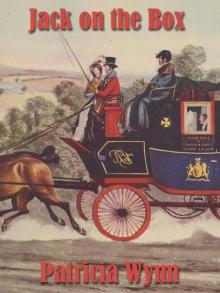 Jack on the Box
Jack on the Box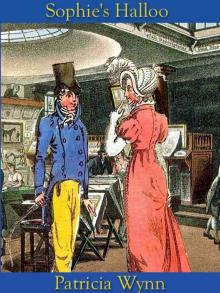 Sophie's Halloo
Sophie's Halloo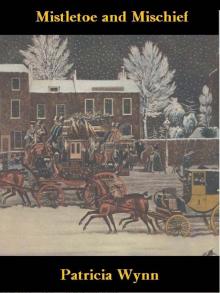 Mistletoe and Mischief
Mistletoe and Mischief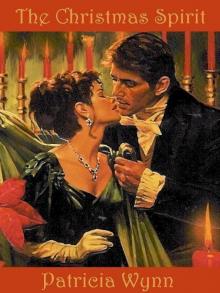 The Christmas Spirit
The Christmas Spirit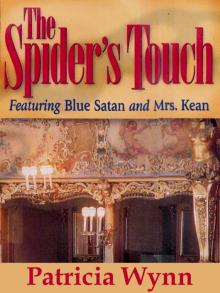 The Spider's Touch
The Spider's Touch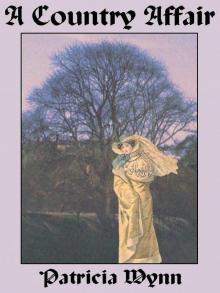 A Country Affair
A Country Affair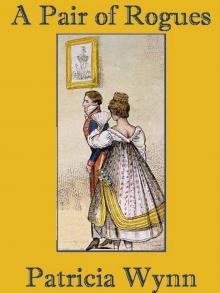 A Pair of Rogues
A Pair of Rogues